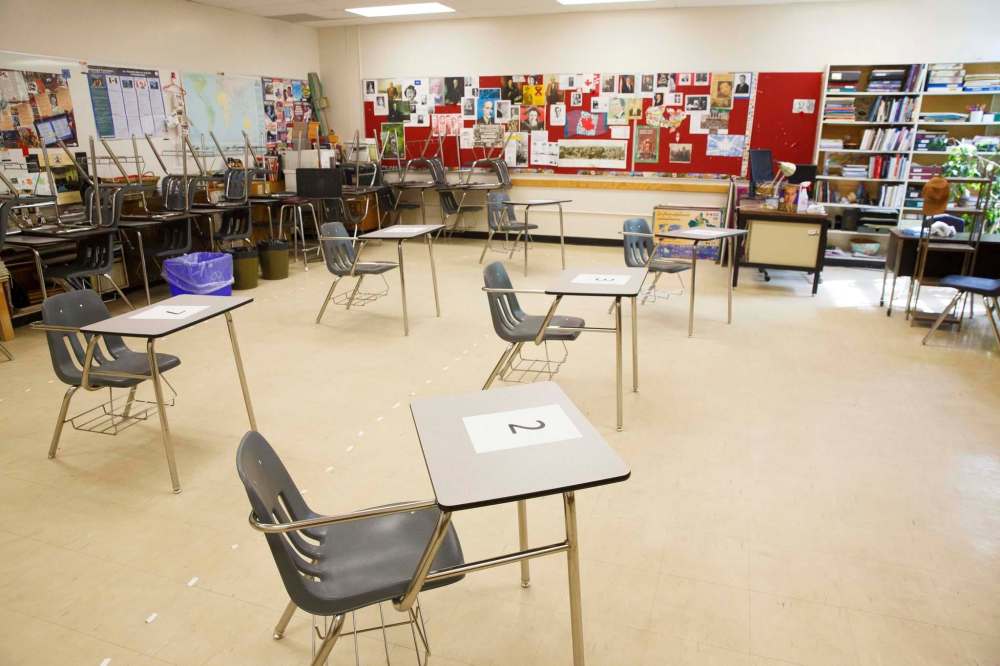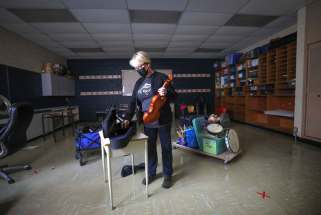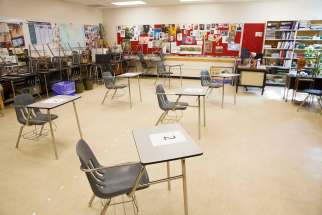Stressed teachers await provincial support
Read this article for free:
or
Already have an account? Log in here »
To continue reading, please subscribe:
Monthly Digital Subscription
$0 for the first 4 weeks*
- Enjoy unlimited reading on winnipegfreepress.com
- Read the E-Edition, our digital replica newspaper
- Access News Break, our award-winning app
- Play interactive puzzles
*No charge for 4 weeks then price increases to the regular rate of $19.00 plus GST every four weeks. Offer available to new and qualified returning subscribers only. Cancel any time.
Monthly Digital Subscription
$4.75/week*
- Enjoy unlimited reading on winnipegfreepress.com
- Read the E-Edition, our digital replica newspaper
- Access News Break, our award-winning app
- Play interactive puzzles
*Billed as $19 plus GST every four weeks. Cancel any time.
To continue reading, please subscribe:
Add Free Press access to your Brandon Sun subscription for only an additional
$1 for the first 4 weeks*
*Your next subscription payment will increase by $1.00 and you will be charged $16.99 plus GST for four weeks. After four weeks, your payment will increase to $23.99 plus GST every four weeks.
Read unlimited articles for free today:
or
Already have an account? Log in here »
Hey there, time traveller!
This article was published 23/10/2020 (1871 days ago), so information in it may no longer be current.
The teachers are not all right.
Since March, Manitoba’s educators have been trying to cope with stress and uncertainty amid the COVID-19 pandemic. From the sudden move to remote learning in the spring, to navigating masking, distancing and cohorts in the fall — all while dealing with personal stresses and fears about the virus — a lot has been demanded of teachers.
A University of Winnipeg study of 2,200 Canadian teachers shows educators’ coping levels, relative to stress, are at an all-time low since the pandemic began. The adrenaline of the early days of the pandemic has worn off, and chronic stress is taking an inevitable toll on those who face it. Many people, teachers and other front-line workers especially, have reported feeling like they’ve hit a “six-month wall” and “pandemic fatigue,” which just so happened to coincide with an upsurge in case counts in Manitoba.
The pandemic picture in this province is worse now than it has ever been. Our teachers are exhausted. And it’s not even Halloween.
Exacerbating teachers’ stress is the fact the province’s pandemic school plan to date has been confusing, abrupt and unclear. Many educators have reported that some of the province’s safety measures only work on paper, especially with respect to class size and physical distancing requirements.
Teachers working in subject areas such as physical education and music have had to dramatically rework their lesson plans because parts of their curriculum are not permitted. Classroom assignments were given to some teachers the Friday before Labour Day. Teachers have been left to figure it out.
And they will be left to figure it out again. On Thursday, new measures were announced for schools in the Winnipeg Metropolitan Region. Schools must ensure two metres of distancing “to the greatest extent possible” and must remove excess furniture from classrooms or repurpose other spaces to achieve it. Students in kindergarten to Grade 8 may be offered a temporary remote-learning option for the duration of the restricted level. Again, many teachers have been left scrambling to accommodate a temporary option.
Per the U of W study, teachers also want to feel heard, recognized and validated. Emotionally and psychologically, their work environment is akin to a bank account that has only debits, and no deposits. It’s hard to keep slogging through if you feel you have nothing left to give — and that no one is listening.

Stress and burnout are also legitimate health issues. Teachers could be squeezed to the point that many are forced to take stress leave, or perhaps leave the field entirely. Classrooms would be poorer for it. Teachers play a crucial role in children’s lives beyond teaching them the fundamentals. Teachers help shape the people children will become. It’s an awesome responsibility in normal times; throw a pandemic with ever-changing requirements into the mix, and the burden becomes crushing.
If a mass exodus happens, however, it will not be because individual teachers “couldn’t handle it” or were unable to cope or adapt. It will be because they were set up to fail. The stresses they currently face are a systemic problem that requires systemic solutions. Teachers have been telling provincial officials exactly what they need — smaller class sizes, more space, more teachers, more time, more support. Why is no one listening?
The stresses detailed in the U of W report should be seen by the province as a figurative coalmine canary, a warning that requires immediate urgent action. Failing to heed those pleas from the classrooms won’t just have consequences for teachers. It will affect our children as well.














